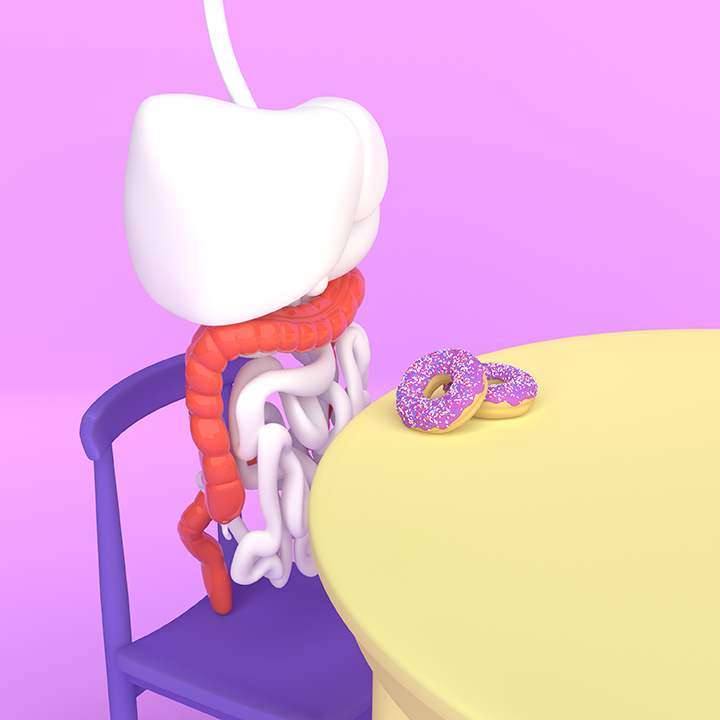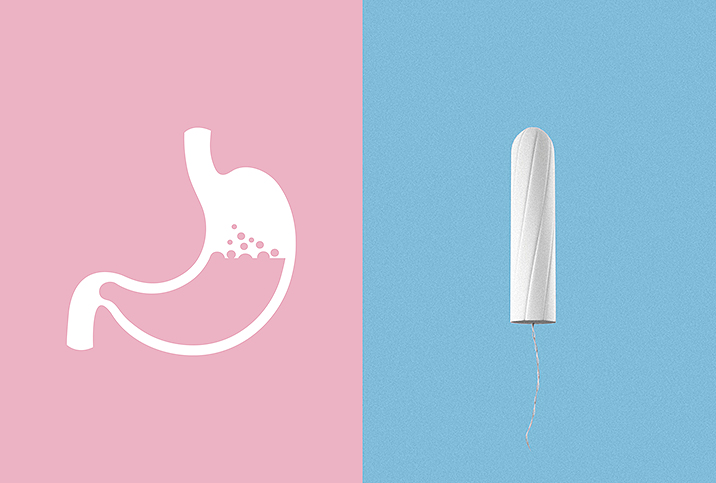Is Birth Control the Cause of Your Digestive Problems?

For many people with uteruses, hormonal birth control—including the pill, patch and progestin IUD—is a godsend. As with any medication, it's not without its risks. Some research indicates a small percentage of hormonal contraceptive users may experience gastrointestinal (GI) issues ranging from temporary nausea to chronic inflammatory bowel disease.
How birth control can affect the digestive system
The digestive tract includes receptor cells for the sex hormones estrogen and progesterone, which can affect pain sensation, digestion and inflammation in the gastrointestinal system. Though not a direct relationship, both progesterone and estrogen levels increase in the luteal phase of the cycle before declining rapidly before menses. Though progesterone is often seen as the culprit with premenstrual constipation, there have been recent studies that might indicate estrogen is the true cause.
That being said, the spike in both may exacerbate symptoms for people with chronic conditions, such as irritable bowel syndrome (IBS) or an inflammatory bowel disorder (IBD) like ulcerative colitis or Crohn's. People with IBD are also more likely to experience other PMS symptoms, such as headaches and menstrual pain.
Dietary changes may affect premenstrual digestion too. Progesterone can increase appetite and cravings for high-fat and high-sugar foods, which can be challenging to digest, leading to gastrointestinal disturbance.
How hormonal contraceptives affect the digestive system
"The most common reason people have digestive issues with hormonal birth control is related to how the hormones work in our bodies," said Kristyn Brandi, M.D., MPH, FACOG.
Like people on a typical period, the estrogen and progesterone changes brought about by birth control can affect digestion in both ways—some patients claim improvement in their IBS with birth control—but there is little research to indicate the pill has an effect on IBS, IBD or digestive health in general.
"It is thought that very high estrogen levels can reduce the number of healthy gut bacteria, thus affecting estrogen metabolism," said Tania Adib, B.Sc. MBBS M.D. MRCOG, a consultant gynecologist and gynecological oncologist based in London, England. "The combined pill can also impair the immune function and cause an increase in the gut permeability. In those women who are genetically susceptible, the combined oral contraceptive pill may triple the chances of developing Crohn's disease."
There is little research to indicate the pill has an effect on IBS, IBD or digestive health in general.
Brandi said there is no conclusive evidence hormonal contraceptives cause Crohn's, ulcerative colitis, IBS or gastroenteritis. Likewise, oral contraceptives do not cause gallstones, although gallstone disease may accelerate more quickly in people predisposed to the condition who are taking hormonal contraceptives.
Adib said the likelihood of digestive disruptions is low for those without preexisting gastrointestinal disorders, though symptoms like nausea, bloating and diarrhea may occur.
"The hormone estrogen, present in the combined pill, can irritate the stomach lining and cause nausea," she said. "Progesterone in the combined pill—and on its own in the mini pill—can relax the smooth muscles and lead to nausea, stomach pain [and] bloating."
Brandi said about 4 percent to 10 percent of people experience nausea as a side effect of contraceptives containing estrogen, including the pill, patch and ring. Fortunately, this symptom usually subsides after a month or two of use.
Birth control options for people with digestive concerns
If you are experiencing digestive trouble, talk to your doctor. There are many types of hormonal contraceptives available, including the IUD and patch, which may have less impact on gut health than the pill.
Experts say for people with severe IBD who have difficulty absorbing medication in the gut or those with gallstone disease, non-oral and progesterone-only methods may be the best choices.
"Methods that are absorbed by your gut—the pill, either type—have to be absorbed and thus can have a higher chance of causing digestive trouble compared to other methods that are absorbed by your skin or vagina," Brandi said. "Also, the higher the dose of medication, the more likely you would have side effects. So maybe switching to a medication that has a smaller amount of hormones would be better for symptoms."
Taking the medication with food, along with a daily probiotic supplement to promote healthy gut flora, may improve digestion and reduce symptoms as well, Adib added.
Stomach issues and pregnancy
Jennefer Russo, M.D., an OB-GYN in Orange, California, said it's important for those with IBD who are capable of becoming pregnant to consider how IBD medication could impact a pregnancy, as well as how pregnancy could affect their disease.
"I would suggest that any person with a chronic disease really consider their disease in the context of their plans to have children and talk with their doctor about how that disease impacts pregnancy and how the pregnancy might impact their disease," Russo said. "We often compare birth control in people with medical diagnoses to the nonpregnant state, but we should really compare it to pregnancy. If someone needs birth control, they are typically at risk of getting pregnant. Pregnancy is riskier for nearly all conditions than birth control is."
'Any person with a chronic disease [should] really consider their disease in the context of their plans to have children and talk with their doctor'
"The pill is a great method of contraception, and people shouldn't be put off by possible side effects. The pill works incredibly well for many people," said Adib. "Discuss your personal medical history and family history with your doctor to see if there are any conditions that may be aggravated by the pill. It is worth trying one pill then switching to another if that one doesn't suit."
"I think we should consider digestion to be a part of a person's overall health and related to their diet, genetics, sex and many other factors that we still don't completely understand. Gastrointestinal issues are common overall—especially in people with uteruses and vaginas," said Russo. "Anyone who begins to experience significant GI issues on birth control should seek a medical opinion based on their history and risks. Sometimes we think that the conditions that occur while on medication were related to that medication when that condition would likely have developed with or without that medication."




















